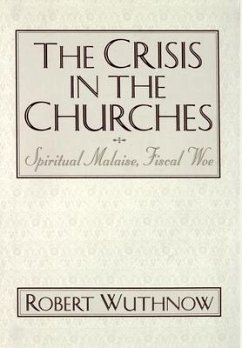America's churches have fallen on hard times. But this crisis, argues Wuthnow, is more than economic; it is at bottom spiritual . Pointing to both the failure of the clergy to confront their financial problems head-on, and their neglect of the real spiritual needs of their predominantly middle-class congregations, it offers suggestions for more effective ministry. This may be of value to economists, scholars of American church history and religion.
At a time when already overworked clergy are being called upon by budget cutting politicians to do more for the poor, the sick, and the elderly, American churches are suffering persistent financial shortfalls. Why are American's churches in financial distress? Robert Wuthnow, a leading commentator on religious life in America, asserts that the steady drop in donations, volunteering, and personal involvement is a direct result of a spiritual crisis - a crisis caused in large part by the clergy's failure to address the vital relationships between faith and money, work, stewardship, giving, and economic justice. In The Crisis in the Churches, Wuthnow offers a searching study of this financial crisis and of the spiritual malaise that has silently grown worse during the past decade. To do this, he lets the churches speak for themselves, quoting extensively from interviews with clergy and laity in sixty Protestant and Catholic congregations throughout the U.S., and drawing from the texts of over 200 sermons, from church financial records, and a national survey. What emerges is that parishioners often feel the church does not care about what they do from Monday to Friday, offers no guidance in their most pressing day-to-day concerns, yet always seems to be asking for more money. Although the situation is critical, Wuthnow finds much cause for hope. He points to ideas and programs that some churches have enacted to challenge their members to think differently about work and money and giving. Parishioners sometimes respond positively when clergy speak boldly and concretely about matters of faith and finance, and some churches have formed small groups whose members meet regularly to discussissues of spirituality, work, personal finances, and stewardship.
At a time when already overworked clergy are being called upon by budget cutting politicians to do more for the poor, the sick, and the elderly, American churches are suffering persistent financial shortfalls. Why are American's churches in financial distress? Robert Wuthnow, a leading commentator on religious life in America, asserts that the steady drop in donations, volunteering, and personal involvement is a direct result of a spiritual crisis - a crisis caused in large part by the clergy's failure to address the vital relationships between faith and money, work, stewardship, giving, and economic justice. In The Crisis in the Churches, Wuthnow offers a searching study of this financial crisis and of the spiritual malaise that has silently grown worse during the past decade. To do this, he lets the churches speak for themselves, quoting extensively from interviews with clergy and laity in sixty Protestant and Catholic congregations throughout the U.S., and drawing from the texts of over 200 sermons, from church financial records, and a national survey. What emerges is that parishioners often feel the church does not care about what they do from Monday to Friday, offers no guidance in their most pressing day-to-day concerns, yet always seems to be asking for more money. Although the situation is critical, Wuthnow finds much cause for hope. He points to ideas and programs that some churches have enacted to challenge their members to think differently about work and money and giving. Parishioners sometimes respond positively when clergy speak boldly and concretely about matters of faith and finance, and some churches have formed small groups whose members meet regularly to discussissues of spirituality, work, personal finances, and stewardship.








